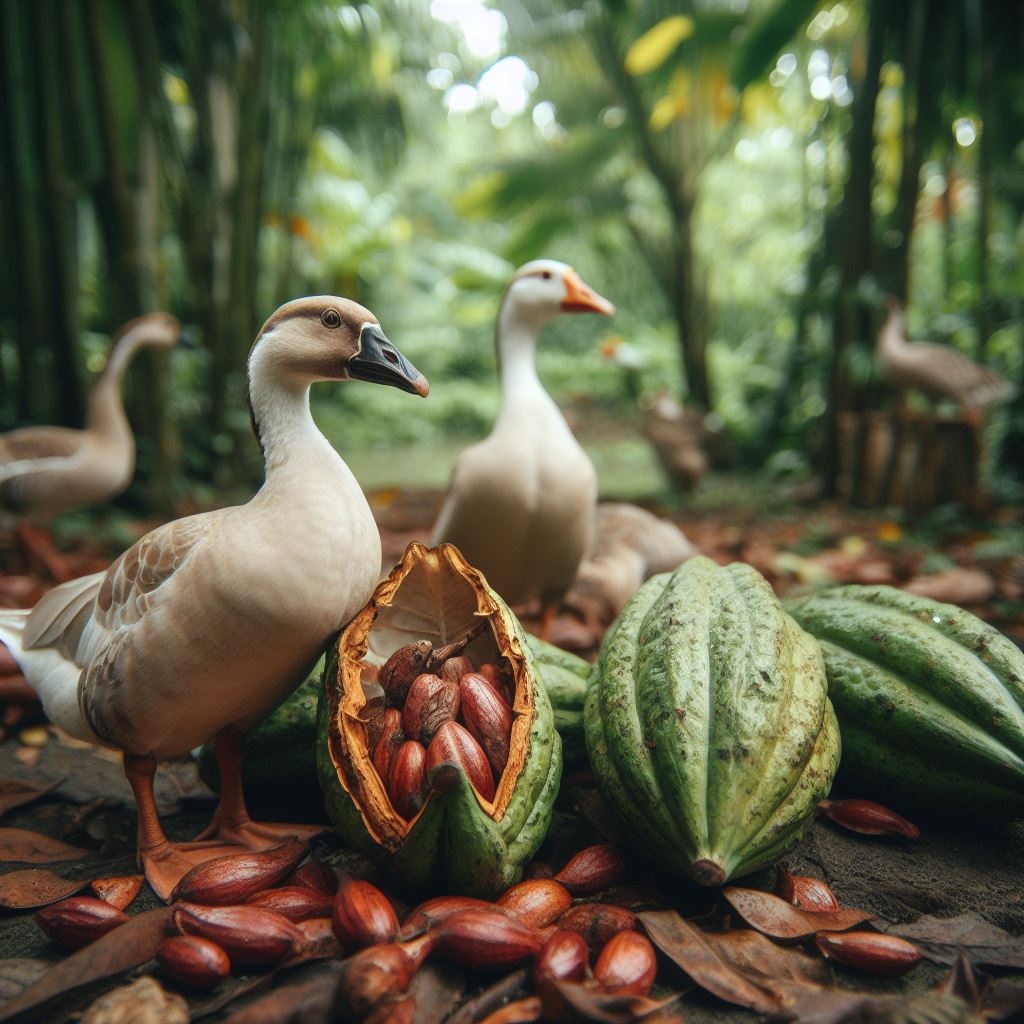Can Geese Eat Blueberries? Nutritious Snack

Table of content:
- An Overview of Wild Geese and Their Diets
- The Nutritional Value of Blueberries for Geese
- Potential Concerns of Feeding Blueberries to Geese
- Tips for Safely Feeding Blueberries to Geese
- Do Wild Geese Eat Blueberries in Nature?
- Can Canadian Geese Eat Blueberries Too?
- Blueberries as an Occasional Treat for Geese
Geese grazing in parks and backyards are a common sight during summertime. These large waterfowl can be seen waddling around ponds, grassy areas, and feeding on plants. As opportunistic feeders, geese will sample different types of food when available. This leads many people to wonder – can geese eat blueberries? Let’s explore this question and learn more about wild geese, their diets, and the benefits and risks of feeding them berries.
An Overview of Wild Geese and Their Diets
Wild geese are herbivorous birds that primarily feed on grasses, aquatic plants, seeds, and grains. The most common types of wild geese found in North America include Canada geese, snow geese, and Ross’s geese. They have serrated edges on their bills to help tear and grind tough vegetation.
Canada geese and other wild geese graze while walking on land or floating in water. They immersively dunk their heads underwater to reach aquatic plants below the surface. A goose’s diet consists of about 90% plant matter, including leaves, stems, roots of grass, and aquatic vegetation.
During certain times of the year, geese will supplement their primary diet with protein-rich foods. When nesting in the spring, female geese require extra protein. Both males and females will eat more insects, snails, crustaceans, and small fish during nesting season.
In the fall when preparing for migration, geese eat seeds, grains, and berries to store more fat. They primarily feed on what is naturally available in their grazing habitats. But if seasonal berries or treats like blueberries are accessible, geese will happily eat them as well.
The Nutritional Value of Blueberries for Geese
Blueberries contain many nutrients that can provide health benefits for geese. Here is an overview of the main nutrients found in blueberries:
- Antioxidants – Blueberries contain high levels of antioxidant compounds like anthocyanins and flavonoids. These can help combat inflammation and boost immune function in geese.
- Vitamin C – One cup of blueberries provides around 24% of a goose’s daily vitamin C needs. Vitamin C supports collagen production, immune health, and tissue repair.
- Manganese – Blueberries are rich in the trace mineral manganese, containing around 50% of a goose’s needs per cup. Manganese helps form bone and cartilage.
- Fiber – Blueberries contain both soluble and insoluble fiber. Fiber supports digestion and gut health in geese.
- Vitamin K – Important for blood clotting, vitamin K is found in decent levels in blueberries.
- Carbs – Blueberries provide important carbohydrates geese need for energy. Especially when migrating, geese benefit from berry sugars.
So in moderation, blueberries can provide useful antioxidants, vitamins, minerals, fiber, and carbs. A few berries can be a nutritious treat. They don’t necessarily provide anything essential a balanced goose diet would be missing. But their nutrients can support goose health.
Potential Concerns of Feeding Blueberries to Geese
While blueberries can be safely enjoyed by geese, there are some potential downsides to offering them:
- Choking hazard – Given their small size, whole blueberries pose a major choking risk for geese. For safety, blueberries should always be chopped or mashed before feeding to geese.
- Sugar content – While geese can tolerate the natural sugars found in fruit, excess sugar is unhealthy. Feeding too many berries may disrupt their nutrition and dental health.
- Lack of protein or nutrients – Geese require balanced diets, including grass, greens, protein-rich foods, and more. While berries provide vitamins, they lack the protein, fats, and nutrition geese depend on.
- Risk of overfeeding – Feeding geese human food can make them overtly reliant on humans for food. Their natural foraging and grazing behaviors may be disrupted.
- Less time spent migrating – Easy access to high-energy foods found in berries may reduce time spent migrating or foraging by geese. This can be detrimental long-term.
- Exposure to pesticides – Non-organic blueberries may contain traces of pesticides geese could ingest. This poses a health risk. Always wash berries thoroughly before feeding.
To minimize these risks, blueberries should only be fed to geese in careful moderation.
Tips for Safely Feeding Blueberries to Geese
If you want to share a few blueberries with your local geese, here are some tips to feed them safely:
- Source organic blueberries when possible to reduce pesticide exposure. Give berries a good rinse just in case.
- Chop the berries finely or mash them well. Whole berries are a serious choking hazard for waterfowl.
- Only feed a few small portions per goose. Around 2-4 chopped berries per bird are sufficient.
- Mix in blueberries sparingly with their regular diet. Combine chopped berries into a grain mix versus offering a bowl of only berries.
- Avoid feeding geese nothing but human foods. A diverse diet of greens, grains, seeds, and insects is vital to their health.
- Prevent large groups of geese from congregating. This helps deter them from becoming overly reliant on human food sources.
- Remove any uneaten berries after 15-20 minutes. Never leave large amounts sitting out as geese can overindulge.
- Rinse geese feeding areas after to remove any berry stains and residue.
By following these precautions, you can safely allow geese to enjoy blueberries as an occasional treat.
Do Wild Geese Eat Blueberries in Nature?
In their natural habitats, geese don’t tend to encounter or consume many blueberries. But during migration and in late summer when blueberries are ripe, they may forage on berries they come across while grazing. Since geese migration spans long distances, they can discover many different food sources along their routes.
In wetlands, marshes, bogs, meadows, and other environments geese frequently, they will eat berries found growing there. Documented wild berries geese feed on when available include:
- Blueberries
- Cranberries
- Strawberries
- Raspberries
- Blackberries
- Elderberries
- Serviceberries
These berry species tend to thrive in the damp areas geese already inhabit. When geese stumble upon berry patches, it provides them an appetizing, energizing forage opportunity.
Since geese migration and berry ripening season align, wild geese most likely consume more berries in late summer and fall. But their berry intake still makes up a very minimal portion of their total diet. The bulk of a goose’s nutrition comes from greens, aquatic plants, seeds, and grains even after encountering some berries.
Can Canadian Geese Eat Blueberries Too?
Canadian geese are one of the most widespread and familiar wild goose species people encounter. Often simply referred to as “Canada geese,” they are named after their breeding grounds in Canada. But they populate many other areas of North America during migration.
The diet and feeding behavior of Canadian geese is very similar to other wild geese species. As grazing herbivorous birds, their primary diet consists of grasses, sedges, aquatic plants, seeds, and grains. Canada geese supplement with protein from insects, small fish, and invertebrates during nesting season.
When accessible, Canada geese will readily feed on ripened berries later in summer. Documented berry species Canada geese eat when available include:
- Blueberries
- Serviceberries
- Elderberries
- Blackberries
- Raspberries
- Wild strawberries
So yes, when blueberries are ripe and reachable, Canadian geese will enjoy snacking on them. Especially before migrating long distances, the extra carbohydrates and energy from berries are beneficial.
Blueberries as an Occasional Treat for Geese
In conclusion, both wild geese and Canadian geese can eat blueberries safely and gain some nutritional value from them. However, berries should only make up a very small portion of a goose’s diverse diet. An occasional handful of chopped blueberries can be a fun treat. But geese truly thrive when focusing their feeding on greens, grasses, seeds, aquatic plants, and insects.
Hopefully this gives you a better understanding of wild geese diets, their ability to eat berries, and some precautions to follow if you want to share a blueberry snack. Let geese nibble on a few chopped berries while still allowing them ample grazing time. Then you can both enjoy those special moments of connection between humans and nature.
Welcome. I’m Adreena Shanum, the proud owner of this website, and I am incredibly passionate about animals, especially poultry. I founded adreenapets.com as a labor of love, stemming from my desire to share my knowledge and experiences with poultry enthusiasts worldwide.



